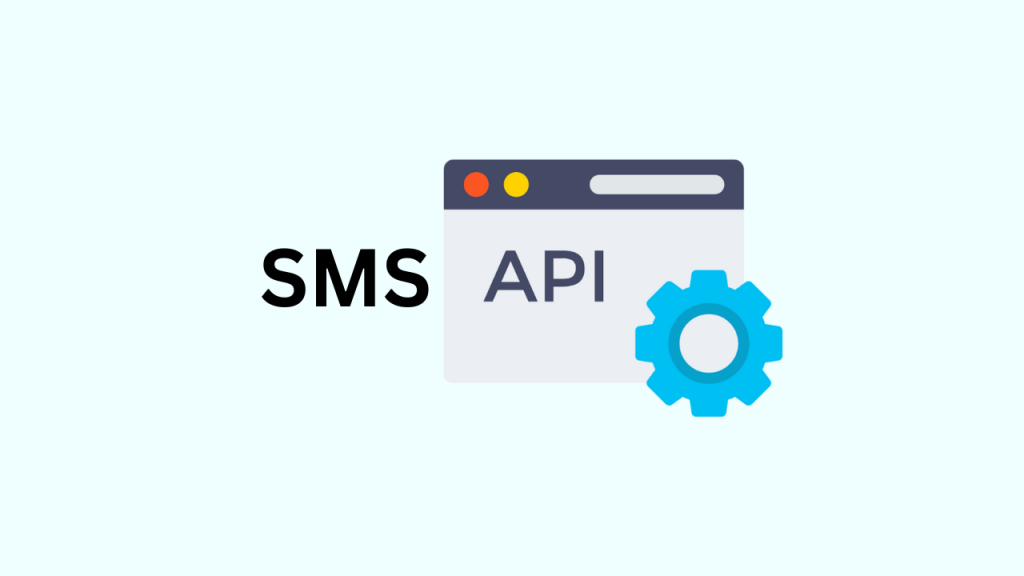Three months ago, your SMS campaigns hit 94% deliverability. Last month, 87%. This month, 81%.
How SMS API works?

One powerful tool that has gained popularity is the SMS API, which allows businesses to integrate SMS messaging into their existing software platforms. In this article, we will explore what an SMS API is, how it works, and why businesses use it.
We will also discuss the types of businesses that can benefit from SMS APIs and how to get started with one. So, let’s dive in and explore the world of SMS APIs!
What Is an SMS API?
An SMS API, or Short Message Service Application Programming Interface, is a type of API that enables businesses to integrate SMS messaging into their software platforms. With an SMS API, businesses can send and receive SMS messages quickly and easily through any website or application. This allows businesses to operate 24/7, providing customer notifications and information even outside of regular business hours.
Unlike manual systems like email, which require hands-on operations and can be slow, an SMS API automates the process of sending SMS messages. This not only saves time but also ensures that messages are delivered promptly and accurately. By eliminating the need for human intervention in routine transactions, businesses can reduce the likelihood of errors and allocate their resources more effectively.
How Does an SMS API Work?
SMS APIs connect telecommunication carriers to the internet, bridging the gap between the two infrastructures. By using an SMS API, businesses can send and receive text messages through logic written for standard web frameworks. This allows web applications to easily incorporate SMS functionality into their workflows.
One popular provider of SMS APIs is Twilio. Their Programmable SMS product offers a stable RESTful API and a range of features that make it easy to integrate SMS functionality into web applications. Twilio provides API endpoints that can be accessed with any programming language and also offers Helper Libraries that simplify the process of building complex communications services.
To send an SMS using an API, businesses can make an HTTP request to the API endpoint, providing the necessary parameters such as the recipient’s phone number and the content of the message. The API then handles the communication with the telecommunication carrier to deliver the SMS to the recipient’s phone.
Why Do Businesses Use SMS APIs?
SMS APIs offer several benefits that make them attractive to businesses. Here are some of the reasons why businesses choose to use SMS APIs:
1. Efficient and Professional Communication
SMS APIs enable businesses to send thousands of text messages in seconds, automatically. This allows businesses to communicate efficiently and professionally with their customers. Whether it’s sending appointment reminders, promotional messages, or important notifications, SMS APIs make it easy to reach a large audience quickly.
2. Personalized Messaging
With an SMS API, businesses can customize their messages, including personalized bulk SMS messages. This allows businesses to tailor their communication to each individual customer, increasing engagement and improving the customer experience.
3. One-Time Passwords (OTPs) and Account Security
SMS APIs are commonly used for sending one-time passwords (OTPs) for account verification and authentication. By using SMS to deliver OTPs, businesses can add an extra layer of security to their systems and protect their users’ accounts from unauthorized access.
4. Appointment and Booking Confirmations
SMS APIs are ideal for sending appointment and booking confirmations. Businesses can automate the process of sending confirmations to customers, reducing the risk of missed appointments and improving overall customer satisfaction.
5. Feedback and Customer Service
By tracking message deliveries through an SMS API, businesses can gather valuable feedback on their customer service efforts. This feedback can help businesses identify areas for improvement and enhance their overall customer experience.
6. Sales and Marketing Campaigns
SMS APIs can be used to promote sales and discounts to customers. Businesses can send targeted messages to specific segments of their customer base, increasing the effectiveness of their marketing campaigns.
7. Shipment Tracking Notifications
For businesses involved in shipping and delivery, SMS APIs can be used to send shipment tracking notifications to customers. This keeps customers informed about the status of their orders and enhances transparency.
8. Automation and Efficiency
SMS APIs allow businesses to automate simple tasks, freeing up staff to focus on more complex and valuable work. For example, businesses can use SMS APIs to send automated reminders, notifications, and updates, reducing the need for manual intervention.
9. Time-Sensitive Messages
SMS APIs are perfect for sending time-sensitive messages at set intervals. Businesses can schedule messages to be sent at specific times, ensuring that important information reaches customers when it’s most relevant.
10. Account Security with Two-Factor Authentication (2FA)
Many businesses rely on SMS APIs for implementing two-factor authentication (2FA) for account security. By combining something the user knows (e.g., a password) with something the user has (e.g., a mobile phone), businesses can add an extra layer of security to their systems.
Types of Businesses That Use SMS APIs
SMS APIs are valuable to a wide range of businesses and organizations that require streamlined and consistent text communication with their customers. Here are some examples of industries that can benefit from using SMS APIs:
- Schools: Schools can use SMS APIs to send notifications to parents and students about important updates, such as school closures or upcoming events.
- Restaurants: Restaurants can use SMS APIs to send reservation confirmations, special offers, and updates about menu changes to their customers.
- Airlines: Airlines can utilize SMS APIs to send flight updates, boarding passes, and promotional offers to their passengers.
- Travel and Hospitality: Hotels, travel agencies, and other businesses in the travel and hospitality industry can use SMS APIs to send booking confirmations, check-in reminders, and travel updates to their customers.
- Insurance Companies: Insurance companies can use SMS APIs to send policy updates, renewal reminders, and claim status notifications to their policyholders.
- Shipping and Delivery Companies: Shipping and delivery companies can use SMS APIs to send shipment tracking notifications and delivery updates to their customers.
- Retail and Online Stores: Retailers and online stores can use SMS APIs to send order confirmations, shipping notifications, and promotional offers to their customers.
- Political Polling Agencies: Political polling agencies can use SMS APIs to conduct surveys and gather opinions from the public.
- Medical and Dental Offices: Medical and dental offices can use SMS APIs to send appointment reminders, test results, and other important health-related information to their patients.
- Banks: Banks can use SMS APIs to send transaction alerts, account balance updates, and security notifications to their customers.
- Government Agencies: Government agencies can use SMS APIs to send emergency alerts, weather updates, and other important information to the public.
- Fundraising and Campaigning Agencies: Non-profit organizations, fundraising agencies, and political campaigns can use SMS APIs to send donation requests, event invitations, and campaign updates to their supporters.
- Utility Companies: Utility companies can use SMS APIs to send billing reminders, outage notifications, and energy-saving tips to their customers.
- Real Estate Agents and Brokers: Real estate agents and brokers can use SMS APIs to send property listings, open house notifications, and appointment reminders to their clients.
- Charities and Nonprofit Organizations: Charities and nonprofit organizations can use SMS APIs to send donation receipts, event invitations, and impact updates to their supporters.
These are just a few examples of the many industries that can benefit from using SMS APIs. Regardless of the industry, businesses that prioritize efficient and personalized communication with their customers can leverage SMS APIs to enhance their customer experience.
Choosing an SMS API Provider
When selecting an SMS API provider, there are several factors to consider:
- Reliability: Choose a provider with a reliable SMS API that offers high delivery rates and minimal downtime. This ensures that your messages reach their intended recipients consistently.
- Scalability: Look for an SMS API provider that can handle your growing messaging needs. Consider the provider’s capacity to handle large volumes of messages and their ability to scale as your business expands.
- Ease of Integration: Choose an SMS API provider that offers easy integration with your existing software platforms and web frameworks. Look for comprehensive documentation and developer resources to facilitate the integration process.
- Security and Compliance: Ensure that the SMS API provider complies with industry regulations and data protection standards. This is particularly important when handling sensitive information or implementing two-factor authentication.
- Pricing and Cost: Consider the pricing structure and affordability of the SMS API provider. Look for transparent pricing plans that align with your messaging volume and business requirements.
- Customer Support: Evaluate the level of customer support offered by the SMS API provider. Look for providers that offer responsive support channels, such as email, live chat, or phone, to assist you in case of any issues or questions.
By carefully assessing these factors, you can choose an SMS API provider that meets your business needs and enables you to effectively communicate with your customers.
Getting Started with an SMS API
If you’re ready to start using an SMS API for your business, there are a few steps you can follow to get started:
- Research and Compare Providers: Research different SMS API providers and compare their features, pricing, and customer reviews. Look for providers that have a good reputation and offer the functionalities you require.
- Sign Up for an Account: Once you’ve selected a provider, sign up for an account. Many providers offer free trials or demo accounts that allow you to test their services before committing.
- Obtain API Credentials: After signing up, you will typically receive API credentials, such as an API key or access token. These credentials will be used to authenticate your requests to the SMS API.
- Read the Documentation: Familiarize yourself with the provider’s documentation and API reference materials. This will help you understand how to use the SMS API and integrate it into your software platforms.
- Integrate the SMS API: Follow the integration guides and code samples provided by the SMS API provider to integrate the API into your applications. This may involve making HTTP requests to the API endpoints and handling the responses in your code.
- Test and Debug: Before going live, thoroughly test your integration to ensure that messages are sent and received correctly. Check for any errors or issues and debug them as needed.
- Monitor and Optimize: Once your integration is live, monitor the performance of the SMS API and optimize your usage as necessary. Keep an eye on delivery rates, response times, and any other metrics that are important to your business.
By following these steps and working closely with your chosen SMS API provider, you can successfully implement SMS messaging into your business operations and enjoy the benefits of efficient and effective communication with your customers.
Final Thoughts
SMS APIs provide businesses with a powerful tool for integrating SMS messaging into their software platforms. By leveraging an SMS API, businesses can send and receive text messages quickly and easily, enabling efficient and personalized communication with their customers. From appointment reminders and promotional messages to shipment tracking notifications and two-factor authentication, SMS APIs offer a wide range of functionalities that can enhance the customer experience and streamline business operations.
When choosing an SMS API provider, it’s important to consider factors such as reliability, scalability, ease of integration, security, pricing, and customer support. By selecting the right provider and following the necessary steps for integration, businesses can successfully leverage SMS APIs to improve their communication strategies and drive customer engagement.
So, if you’re looking to enhance your business’s communication capabilities, consider exploring the world of SMS APIs and discover the endless possibilities they offer. Start researching, compare providers, and take the first steps towards implementing an SMS API that will revolutionize your customer communication.
More Articles


SMS Marketing, SMS, sms carrier, tcpa
Why SMS Marketing Might Be Dead in 5 Years—If Carriers Keep This Up
For over a decade, SMS marketing has been the bedrock of mobile engagement. With open rates often cited above 95% and near-universal device compatibility, it seemed indestructible. Yet today, industry insiders are sounding the...

SMS, sms carrier, tcpa, tcpa restrictions
Are SMS Compliance Rules Silencing Free Speech in Marketing?
Few marketing channels are as tightly controlled — yet so widely used — as SMS. Behind every promotional text lies an invisible gauntlet of carrier rules, algorithmic filters, and registration barriers. Most recipients never...